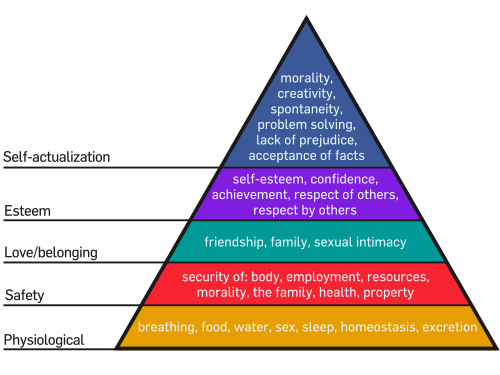Archive for December, 2013
Web Doomsday: The Loss Of A Luxury, Convenience And Basic Need no comments
In this post, I’ll be looking at how losing access to the web could be analogous to losing access to other resources that we are dependant on. In this respect, I’ll be looking at the web in three categories: a luxury, a convenience and a basic need.
Understanding this needs the study of people and society. A good place to start is with Anthropology, which, in her book What Do Anthropologist Do? Veronica Strang, is defined as “a social science that involves the study of human groups and their behaviour”. It seems perfectly suited for understanding the relationship between groups of of people and the web.

Maslow’s Hierarchy of Needs with the most basic needs at the bottom.
The psychologist Abraham Maslow devised a way of categorising psychological needs as a hierarchy. From the most basic needs to the needs for self-actualisation, the web has changed every aspect for modern society – online dating, employment in the web, getting information about health through the web, online communities and friendships, the web as a way of expressing creativity etc. Anthropology is increasingly relied on to consider these issues.
For some, the web is merely acts as an alternative to the real world – not really forming part of daily life, and more for the occasional streaming of a movie for entertainment. For these people, the web is a seldom-used luxury. Some people use the web more often, perhaps for online shopping or communicating with friends that they know in real life. The web is a convenience for these people. Finally, there are those who depend on the web for friendships, dating, and even getting food if going to the shops is not a viable option. For these people, the web is a basic need.
Losing the web will affect the latter the most, whose basic needs are fulfilled by access to the web. Meanwhile, those who use the web as a luxury may not find themselves directly affected. Could there be a greater dependence on the web in the future for these individuals?
In the next blog post, I will consider what the indirect effects of a web blackout may be for those who use the web as a convenience or a luxury.
Web Doomsday: Great Firewall of China Case Study no comments
In this post, I will discuss how censorship in China is analogous to the lack of web availability. In this, I will consider how people have reacted and what the long-term effects have been.
In mid-2012, Michael Anti, a web blogger from China, shared his experience from behind the Great Firewall of China in a TED talk. In China, there exists heavy censorship on a country-wide and local scale – the biggest digital censorship in the world. This is despite it having over 500 million internet users, and over 300 million microbloggers – almost the population of the USA. So called Chinanet due to its partial segregation from the worldwide Internet, it is particularly famous for blocking common web services from Chinese citizens, such as Facebook and Twitter. But Anti describes how following blocks, it is common for new similar services to pop up for use only within China. One example is Weibo in place of Twitter – it looks like Twitter, behaves like Twitter and people use it like Twitter.

Weibo.com
So what is the motivation behind this? Why does the government feel that services used within China use should be hosted in China? Anti explains that when a service is run in China, the government has access to the data. With this, they have the ability to monitor and police the activities that happen online. For example, someone trying to arrange a coup (even if it was just a joke) would be immediately flagged and arrested. It’s not possible to post the name of the president, post the city “Chongqing” or search for the name of many famous leaders. If a group of people arrange to meet, the police will be at the meeting place ready to turn people back. This is the government’s response to a fear that a large congregation, whether on the web or in person, is a threat to the regime that could lead to a revolution.
But Anti also raises the point that Chinese citizens live like this, with relatively few disturbances caused by the censorship. This is in great contrast to Hosni Mubarak’s shut down of the internet in Egypt, which caused riots on the street. Anti suggests that in China, the firewall is not perceived as an extreme measure – it’s possible to still speak out online. He give the example of a train crash involving two high-speed trains. Millions became angry at the railway minister ‘s handling of the situation, accusing him of a cover-up. Protesters took to microblogging, despite the tight control of what is posted. But the rail minister was subsequently sacked. Anti suggests that the government were fed up of the rail minister and used public opinion as an excuse to sack and imprison him. Anti further suggests that this happens on a much wider scale – people are free to criticise those that the government secretly wish to discredit. In other words, the censorship has become a tool for a political fight.
Anti describes it as a cat-and-mouse game, where internet-users (the mice) are in a constant pursuit by the censorship (the cat). He goes on to suggest that these cats may spread to a wider audience, with legislation such as SOPA, PIPA, ACTA, TPP and ITU becoming threats to the freedom of the Web. Further to this, he questions whether we should believe the big companies such as Faceook and Google are friends of the mouse, or if they are becoming the cats. After all, if the West were to experience loss of the web in some degree caused by a political agenda, it would probably be sudden, in the form of legislation or commercial interest. So Anti’s warning is apt – the risk to the web from political and commercial interests is very real, and now is an important time to consider those risks.
In the next blog post, I’ll be discussing the web as a convenience and a luxury, and what the reaction might be if we were to lose the web.
Interdisciplinary synthesis no comments
Psychology and computer science are clearly distinct disciplines. As we have seen, there are obvious differences within the definitions and methodological approaches of the two. Still, despite the differences, there are some interdisciplinary subfields that try to fuse the two.
An interdisciplinary perspective on the two disciplines is cognitive science, wherein the human mind is seen as an information processor, a machine. According to cognitive scientists, the mind sees information in the same manner as computers do. First, it receives ‘input’ from a source. Then, this input is stored on some kind of ‘hard drive’. Finally, the input will be processed. The results of this process is the ‘output’ (Friedenberg, Silverman, 2006: p. 3). The mental representation of information is thus a significant part of cognitive science, which can be compared with information processing on computers.
A field that draws upon this is human-computer interaction (HCI). HCI can be seen as a merge between cognitive psychology and programming aspects of computer science, to create well designed interfaces. According to Carroll, it looks at how humans interact with technology, and how that can be supported through the design. It came into being partly because of “the recognition that computers can be deliberately designed to facilitate human activity and experience only when social and cognitive requirements drive the design process throughout” (Carroll, 1997: p. 62, 79). Therefore, cognitive psychology should be considered for the design of computer systems.
Another example is artificial intelligence (AI), early mentioned as a subset of computer science. AI scientists try to build machines that can automatically make intelligent decisions. They try to do this at the level of intelligence of a human agent, which should lead to the fact that the machine can act in the same manner as humans (Friedenberg, Silverman, 2006: p. 320). The consideration of what this intelligent behaviour is, comes from psychology.
Sources
Carroll, John M. (1997) ‘HUMAN-COMPUTER INTERACTION: Psychology as a Science of Design’, Annual Rev. Psych., 48, pp. 61-83.
Friedenberg, Jay, Gordon Silverman. (2006) Cognitive Science. An introduction to the Study of Mind. Thousand Oaks: Sage Publications Inc.